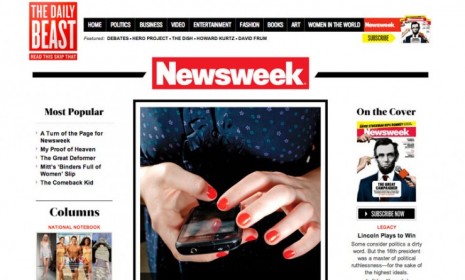Can Newsweek survive as a digital-only publication?
"We are transitioning Newsweek," insists editor-in-chief Tina Brown, "not saying goodbye to it."

A free daily email with the biggest news stories of the day – and the best features from TheWeek.com
You are now subscribed
Your newsletter sign-up was successful
Newsweek dropped a bomb on Thursday, announcing that at year's end it will shutter its money-bleeding print publication after an eight-decade run, marking what feels to many media pros like the latest step toward print's inexorable death. In a statement, editor-in-chief Tina Brown, who has overseen Newsweek's sometimes awkward marriage to the online news site The Daily Beast, insisted, "We are transitioning Newsweek, not saying goodbye to it." She also unveiled a new, digital-only publication called Newsweek Global that "will be supported by a paid subscription and will be available through e-readers for both tablet and the web, with select content available on The Daily Beast."
Can Newsweek survive as a digital-only publication? Not with a subscription, says Felix Salmon at Reuters:
The chances that Newsweek will succeed as a digital-only subscription-based publication are exactly zero. If you had a team of first-rate technologists and start from scratch trying to create such a beast, you’d end up with something pretty much like Huffington — which lasted exactly five issues before bowing to the inevitable and going free...
The Week
Escape your echo chamber. Get the facts behind the news, plus analysis from multiple perspectives.

Sign up for The Week's Free Newsletters
From our morning news briefing to a weekly Good News Newsletter, get the best of The Week delivered directly to your inbox.
From our morning news briefing to a weekly Good News Newsletter, get the best of The Week delivered directly to your inbox.
Newsweek is going to have to suffer a painful and lingering death. There’s no way that first-rate journalists are going to have any particular desire to write for this doomed and little-read publication, especially if their work is stuck behind a paywall. At the margin, it will certainly be better to work for the Beast than for Newsweek: The supposedly "premium" arm will in reality be the bit which smells like old age and irrelevance. It's not going to work. So, really. Why even bother?
Don't count Newsweek out yet, argues Andrew Sullivan at The Daily Beast:
I now read almost everything on my iPad. And as I ramble down the aisle of Amtrak's Acela, I see so many reading from tablets or laptops, with the few newspapers and physical magazines seeming almost quaint, like some giant brick of a mobile phone from the 1980s. Almost no one under 30 is reading them. One day, we'll see movies with people reading magazines and newspapers on paper and chuckle. Part of me has come to see physical magazines and newspapers as, at this point, absurd. They are like Wile E Coyote suspended three feet over a cliff for a few seconds. They're still there; but there's nothing underneath; and the plunge is vast and steep.
Which is why, when asked my opinion at Newsweek about print and digital, I urged taking the plunge as quickly as possible.
A free daily email with the biggest news stories of the day – and the best features from TheWeek.com
Well, if it's to succeed, a new Newsweek has to adopt "an attitude, a focus, an editorial voice," instead of relying on gimmicks, says John McQuaid at Forbes:
In [the] Tina Brown era, supposedly the dawn of a new attitude, Newsweek has gyrated through a series of increasingly embarrassing attempts to goose its traffic by trying on different attitudes like cheap suits. There was the "if Princess Di were alive" business, Niall Ferguson's error-ridden attack on Barack Obama, Andrew Sullivan's Obama hagiography, and most recently, a piece purporting to prove that "heaven is real," repeating about 50 bestselling mass-market books and Parade magazine covers of the past decade, but of course doing no such thing. No, I'm not going to link to them! In the process, its editorial standards have fallen (does it even have editors? the bad writing in the "heaven" piece implies otherwise), and its voice became a primal scream of desperation. There was still some good journalism being produced by capable journalists, but what better way to undermine their work than by topping it off with nonsense?
-
 The ‘ravenous’ demand for Cornish minerals
The ‘ravenous’ demand for Cornish mineralsUnder the Radar Growing need for critical minerals to power tech has intensified ‘appetite’ for lithium, which could be a ‘huge boon’ for local economy
-
 Why are election experts taking Trump’s midterm threats seriously?
Why are election experts taking Trump’s midterm threats seriously?IN THE SPOTLIGHT As the president muses about polling place deployments and a centralized electoral system aimed at one-party control, lawmakers are taking this administration at its word
-
 ‘Restaurateurs have become millionaires’
‘Restaurateurs have become millionaires’Instant Opinion Opinion, comment and editorials of the day